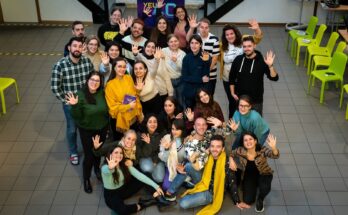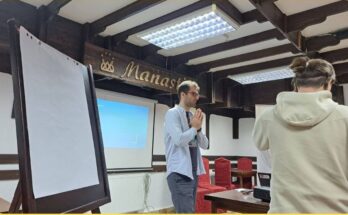During the last weeks of October, an online training on Online Facilitation took place under GamifyEU project. It was organised by DYPALL Network and YEU International in the framework of the European cooperation project YES! GAM-EU: Youth Engagement Strategies and Gamification in the EU, a long-term project developed in partnership between five organisations: YEU International, DYPALL Network, Sauga ANK, Active Bulgarian Society, and La Fenice.
This training was developed due to Covid-19 circumstances. Offline events can hardly take place, so the only solution is to move it into online platforms. However, this changes the dynamics and the way of facilitating sessions. They need to be readapted to these new online platforms, despite the fact that most of the trainers and facilitators have not been prepared for this new situation. Hence, this programme has been developed to teach trainers and facilitators how to cope with these new conditions and to adapt sessions to the new online paradigm.
The objectives of the online training course were to understand what changes within training activities happened due to the COVID-19 condition; to explore and increase competences with ICT tools, necessary for online learning facilitation; to reflect on the role of trainers/facilitators individually and as a team and as online facilitators; to share hints and tips for online learning facilitation; to practice the new tools and capabilities in simulations followed by feedback and supported by the trainer (mini-coaching) and to create awareness of the importance of detailed preparation and standardisation.
It gathered around 25 participants from all around Europe, whose profile was mainly facilitators interested in developing the capacity to prepare, implement, and evaluate online learning activities for young people.
The course was delivered in five days: 19th, 20th, 26th, 29th, and 30th of October, from 14:00 to 18:00 approximately. It was run on Zoom, which thanks to its many tools such as breakout rooms, reactions, group and individual chat, screen sharing, and many others, the sessions were quite dynamic.
The first session’s aim was to get to know each other and to learn to identify some basic, but very interesting and engaging tools for online facilitation, such as Padlet, Jamboard, and Mentimeter among others.
During the second session they worked on some DOs and DON’Ts of online participation, they learned some useful tips and tricks and reminded themselves about the essentials of facilitation. The participants were divided into groups, in which they would plan and prepare a program to facilitate during the last training sessions with all the contents and resources learned previously.
The third session’s aim was to reinforce some of the previous knowledge and to prepare in groups the sessions to be facilitated during the last two sessions.
The last two sessions were mainly practical, where participants facilitated in groups a small session of 25 minutes each. After that, they received feedback from the trainers.
The goal of this online course then is achieved, because the theory has been put into practice during the last two sessions. Participants are satisfied with the results and feel more confident to facilitate online sessions for young participants.





